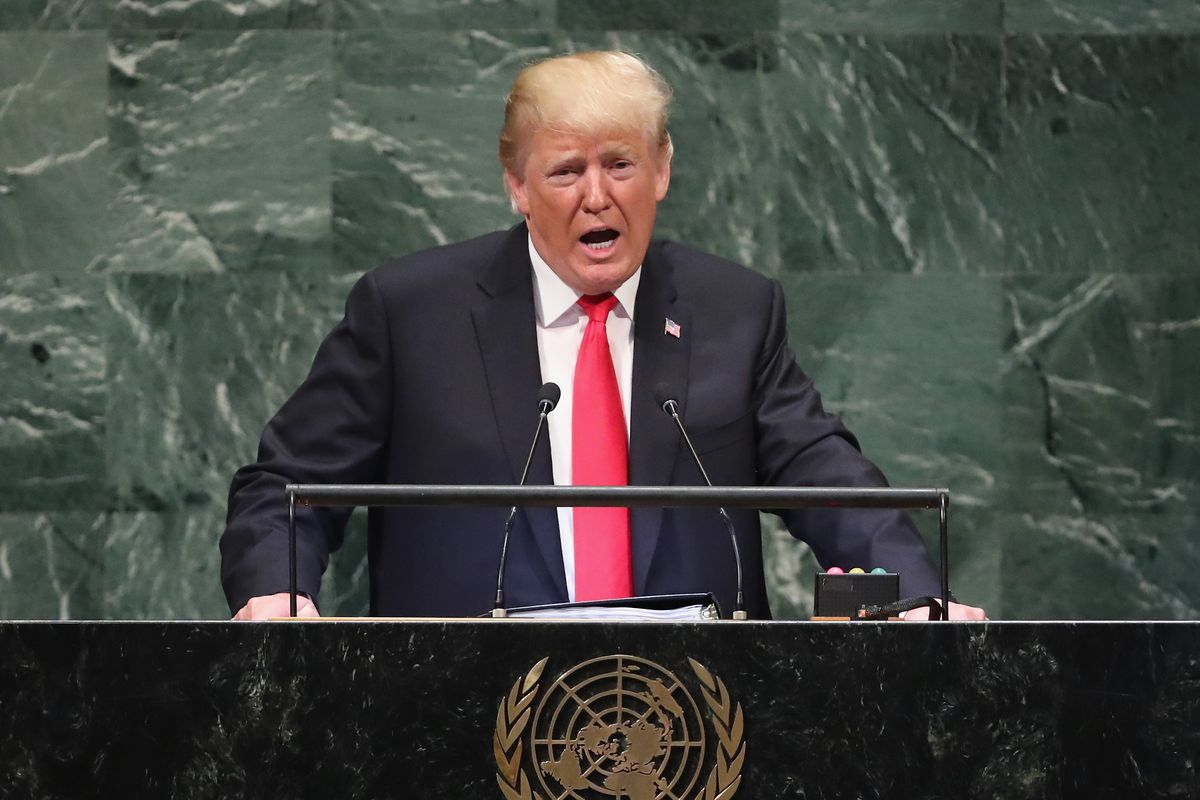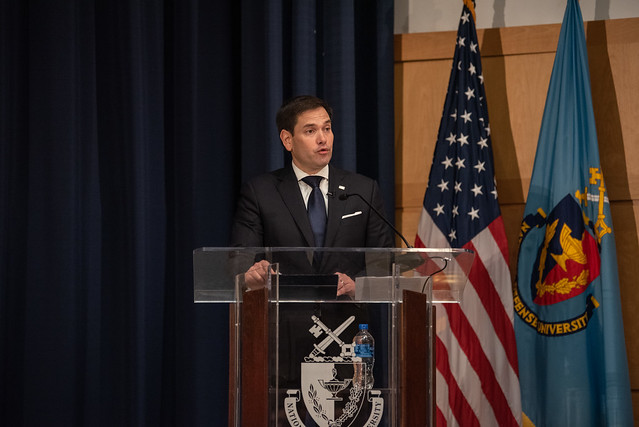Heed Trump’s Warning on Sovereignty

“The future does not belong to globalists,” President Trump told the dedicated globalists at the United Nations in his speech there last month. “The future belongs to patriots. The future belongs to sovereign and independent nations who protect their citizens, respect their neighbors, and honor the differences that make each country special and unique.” In this rousing defense of nationalism, patriotism, and the nation-state, Trump clearly held up the United Kingdom as a warning: “If you want democracy, hold on to your sovereignty.”
Trump was dead on: the difficulty that Great Britain is having in withdrawing from the European Union—based on a vote of the people opposed by its ruling class—is a stark example of what the future may hold under the world homogeneous state. But it is just one such example, and a small one relative to what would be to come.
The Death of Britain
There is no doubt that Great Britain’s membership in the European Union has significantly undermined its sovereignty. The erosion of British sovereignty was accomplished gradually and by indirection, but it has been substantial nevertheless. As historian Anthony King notes in The British Constitution (2007): “Not only did Parliament cease to be sovereign, Britain itself ceased to be an old-fashioned sovereign state. The fact of being a member of the EU permeates almost the whole of the British government–to a far greater extent than most Britons seem to realize.” Defenders of the EU maintain the erosions of sovereignty that have occurred have been with the complicity and approval of the British government, and have actually worked to the long-run advantage of the British people.
The European Communities Act of 1972 presaged things to come, asserting the supremacy of European Community law, treaties, regulations, directives, as well as the decisions of the European Court of Justice. The Act made all EC law and its successor European Union law binding on the United Kingdom Parliament and the UK court system demanded strict adherence to the European Court of Justice decisions, as the professors Ian Loveland and Neill Nugent documented in the mid 1990s.
The infamous Factortame case is illustrative. The House of Lords announced a decision in 1990 holding that it would “disapply” the Merchant Shipping Act of 1988 which regulated non-British fishermen from registering their boats in Britain to obtain fishing rights in British waters because it violated European Community laws. At the time, Margaret Thatcher bitterly complained that the decision to submit to the European Commission “was a novel and dangerous invasion…of the sovereignty of the UK Parliament.” But as one unsympathetic commentator cited by Nugent rightly pointed out, “Parliament had been quite aware of the supremacy doctrine in 1972, so any limitation of sovereignty that Economic Community membership entailed was voluntary. The European Communities Act [of] 1972 had ordered domestic courts to respect that voluntary limitation, so there was nothing novel in the judgment. The House of Lords’ judgment thus falls far short of an ‘end to the sovereignty of Parliament’.” The administrative apparatus, of course, moves by indirection and stealth. Its minions are unelected and not responsible in any political sense; as long as these policymakers can retain their political anonymity, they can avoid attention and evade the issue of sovereignty.
The issue of sovereignty, however, came to the forefront in Britain’s relations with the EU. As Christopher Caldwell explains in the current issue of The Claremont Review of Books: “It was always understood that joining the EEC in 1973 compromised Britain’s national sovereignty. All countries that joined had to acknowledge the supremacy of EU law over their own…. The EU destroyed the system of parliamentary sovereignty at the heart of Britain’s constitution. For all its royalist trappings, Britain has traditionally been a much purer representative democracy than the United States, because it excludes courts from reviewing legislation on any grounds. British politicians tried to calm the public with assurances that, where British law and EU clashed, British law would prevail. But the acknowledgement of EU legal supremacy in the treaties meant that EU law was British law.”
The UK High Court has now decided a highly charged political question that by “convention and practice” would have previously been considered “nonjusticiable.” The Court ruled that even prerogative power has its limits and it’s the Court’s responsibility to determine those limits; Boris Johnson had exceeded the limits of his prerogative powers when he asked the Queen to prorogue the Parliament. “It is impossible for us to conclude,” the unanimous Court tendentiously declared, “that there was any reason—let alone a good reason—to advise Her Majesty to prorogue Parliament for five weeks.” The typical prorogation time for a new Queen’s Speech, according to testimony taken by the Court, is four to six days. The five-week prorogation requested by Prime Minister Johnson was devoid of any “hint that the Prime Minister, in giving advice to Her Majesty, is more than simply the leader of the Government seeking to promote its own politics” rather than meet his “constitutional responsibility.”
In other words, the Prime Minister was trying to prevent any attempt on the part of the House to prevent a “no-deal Brexit” when Britain was scheduled to leave the EU on October 31. Thus the High Court for the first time entered a dangerous “political thicket” from which it is unlikely ever to emerge, especially if the UK fails to extricate itself from the EU.
Here There Be Dragons
The High Court’s description of the “flexible” British Constitution open to “further development” under the tutelage of a Court willing to enter the untested waters of areas that were traditionally considered “nonjusticiable” seems to be an open announcement on the part of the Court that it intends to become an active participant in constitutional politics, if not politics directly. The tone of the High Court’s opinion, especially the easily detectible hostility imputed to the Prime Minister’s motives for prorogation, makes the Court appear to be part of the British establishment that opposes Brexit. This, of course, is not surprising. In any case, sovereignty in the UK has always belonged to the Crown in Parliament; the High Court has now taken its place alongside the Crown.
Great Britain—the land of Hobbes and Locke—is confronted with a dilemma that is difficult to believe was of their own making. Sovereignty once ceded is difficult to regain, if it can ever be regained. The UK’s constitutional crisis is brought about simply by the fact that Great Britain foolishly decided to cede sovereignty to a supra national organization. Even if the UK succeeds in withdrawing from the EU, sovereignty will not be restored to pre-1972 levels. The people of Great Britain expressed their judgment in a constitutional referendum. The ruling elites—politicians and the administrative class, including the administrative class in the EU, intellectuals, international corporate and business elites—are doing everything in their power to nullify that election. Many leading progressive liberals argue that the people who voted for Brexit didn’t understand the consequences of their vote and should have left the decision to experts. Experts predict dire economic results: higher food prices, shortage of medicines, massive disruptions of supply lines, trade disputes, economic recession and a host of other problems that the “leave” voters were unable to calculate. These are issues that liberalism insists should not be left to the democratic process because voters do not have the knowledge or expertise required for self-government.
Liberals do not credit the fact that the voters might harbor a legitimate skepticism of the predictions of economic experts who are only too eager to curtail freedom to fulfill the predictions of their economic models. They might even be excused for thinking that these experts were part of the ruling establishment who had a vested interest in opposing Brexit. We have only to think here of the Nobel Prize-winning economist Paul Krugman who predicted that Donald Trump’s election would return the American economy to 1929 depression levels, from which he gravely calculated it would never recover—a prediction quickly falsified by events. It is quite likely that British voters made the same judgment about the value of the predictions about Brexit by similarly qualified experts whom they knew were driven by similar progressive ideologies.
No Nation-State, No Constitutional Government
Trump’s presidential campaign emphasized the importance of the nation-state and the vital importance of citizenship and borders. There cannot be a nation-state without sovereignty, which means control over who becomes citizens and control over borders. This is something that Trump well understands. He also understands, as he noted in his U.N. speech, that the nation-state is only political organization that fosters constitutional government. The universal state—and even regional organizations like the EU that point to the universal state as its terminus ad quem—cannot sustain constitutional government. However well-intentioned their beginnings, they inevitably lapse into administrative tyrannies, insulated from the inconvenience of having to consult “the consent of the governed.”
This was precisely the message of President Trump’s UN speech: the sovereignty of the nation-state is the surest way to guarantee the rights and liberties of citizens. In particular nations, citizens share a common good and have privileges and immunities that are unique and exclusive. The Declaration of Independence announces that America has become a “separate and equal” nation dedicated to promoting the “safety and happiness” of the people. The happiness of the people provides the ground of friendship that is the basis of citizenship and this can only be found in particular nations that are sovereign. No one can be a “citizen of the world.” The phrase itself is a simple contradiction. To be a citizen is to belong to a particular regime, and a particular regime cannot be a universal regime. The universal particular is unknown to the real world and even to the world of metaphysics! The “universal person” may be a post-modern fantasy, but the “universal citizen” cannot even rise to the level of “fantasy,” post-modern or otherwise.
However much President Trump intended to caution the UK and encourage Brexit in his UN speech, his remarks I believe were mainly directed at French President Emmanuel Macron who delivered a stinging rebuke in his presence in a speech on November 11, 2018, in front of the Arc de Triomphe in Paris, marking the 100th anniversary of the end of World War I. The millions who died in the Great War, Macron declared, were fighting to defend the “universal values” [valeurs universelles] of France, those values that rejected “the selfishness of nations only looking after their own interests.” “Patriotism,” Macron avowed, “is the exact opposite of nationalism: nationalism is its betrayal” [trahision]. Patriotism, as Trump emphasized in his U.N. speech, includes, not only the love of one’s country, but its unique culture, history, religion and traditions. These all support the nation-state and nationalism. The patriotic Frenchmen who fought bravely in the war would no doubt be surprised by Macron’s revisionist history. It is difficult to believe that the soldiers who endured such great sacrifices in the defense of France were not inspired and sustained through their long ordeal by a deep sense of patriotism. It is almost impossible to believe that such great sacrifice could be mounted on behalf of “universal values” only remotely connected to their homeland. Does anyone believe they were concerned with eradicating the “egoism” of nations? This surely exceeds the wildest post-modern fantasy which seems to have inspired President Macron’s attack on the nation-state!
The American Mind presents a range of perspectives. Views are writers’ own and do not necessarily represent those of The Claremont Institute.
The American Mind is a publication of the Claremont Institute, a non-profit 501(c)(3) organization, dedicated to restoring the principles of the American Founding to their rightful, preeminent authority in our national life. Interested in supporting our work? Gifts to the Claremont Institute are tax-deductible.
Senator Marco Rubio speaks at National Defense University on the need for a ‘pro-American industrial policy’ to counter China.
Capitulation and cowardice hand America to identitarian propagandists.
Some last-minute advice for the convention.





